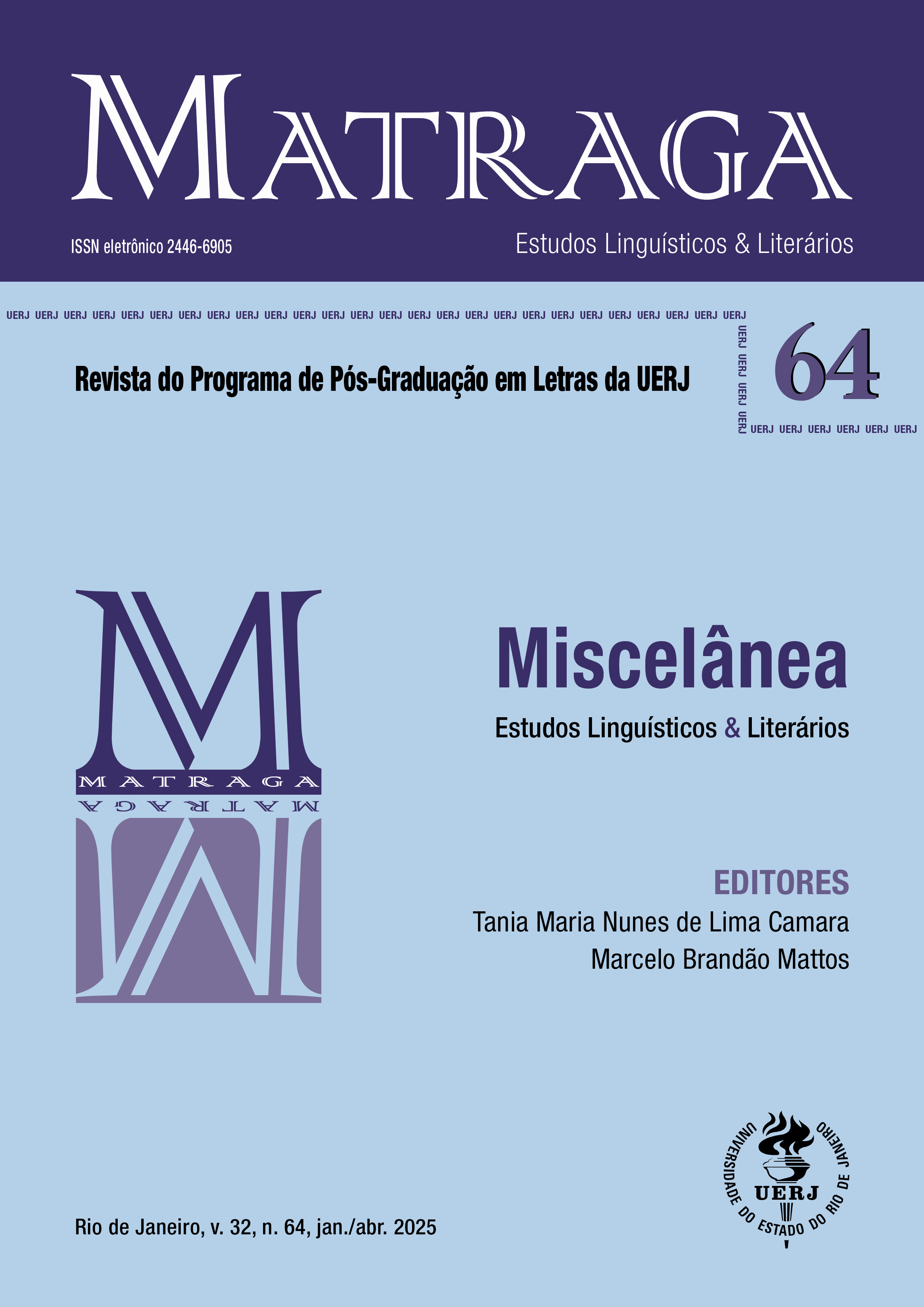Mãe of thousand affections: The reinvention of family in O filho de mil homens, by Valter Hugo Mãe
DOI:
https://doi.org/10.12957/matraga.2025.85366Keywords:
Valter Hugo Mãe, O filho de mil homens, Affection, Vulnerability, FamilyAbstract
This article focuses on the work O filho de mil homens (2011), by Valter Hugo Mãe, with the aim of analyzing how loneliness, when transmuted into affection, raises the creation of other possible worlds in and from literature. In this sense, the text addresses issues related to dehumanization associated with the vulnerability of bodies that do not fit the standard, establishing contact in a very fruitful way with several other texts that mark history of Western literature. It is in the wake of this great conversation that the article seeks to think about Mãe’s work and the perspectives that emerge from its reading. The origin and nature of affections are closely related to the subjects’ way of life, and it is, above all, in the encounter of differences that the work provides us with another way of redefining the world and the meaning of family. To this end, the approaches of Foucault (1976), Delumeau (2009), Agamben (2007), Spinoza (2017), Nietzsche (2009) and Chauí (2000) will be of significant importance. In addition,there were contributions of Bachelard (2018) and Bakhtin (1998).
Downloads
References
AGAMBEN, Giorgio. Profanações. Trad: Selvino J. Assmann. São Paulo: Boitempo, 2007.
BACHELARD, Gaston. A água e os sonhos: ensaio sobre a imaginação da matéria. Trad: Antônio de Pádua Danesi. 3ª Ed. São Paulo: WMF Martins Fontes, 2018.
BAKHTIN, Mikhail. Questões de literatura e de estética: a teoria do romance. Tradução: Aurora F. Bernar- dine et al. 4. ed. São Paulo: Unesp | Hucitec, 1998.
CHAUÍ, Marilena. Paixão, ação e liberdade em Spinoza. In: Folha de S. Paulo. 20 ago 2000. Disponível em:
<https://www1.folha.uol.com.br/fsp/mais/fs2008200006.htm>. Acesso em: 29 jan. 2024.
DELUMEAU. Jean. História do medo no Ocidente 1300-1800: uma cidade sitiada. Trad. Maria Lucia Ma- chado; trad. de notas de Heloísa Jahn. São Paulo: Companhia das Letras, 2009.
FOUCAULT, Michel. História da sexualidade 1: a vontade de saber. Trad. Maria Thereza da Costa Albuquer- que e J. A. Guilhon Albuquerque. 12ª ed. Rio de Janeiro/São Paulo: Paz e Terra, 2021.
JOYCE, James. Ulisses. Trad: Bernardina da Silveira Pinheiro. 2ª Ed. Rio de Janeiro: Nova Fronteira, 2022.
LACOMBE, Fernanda Gappo. Cuncas de aguardente e danças com monstros: política, corpo e imaginário em A esmorga e Balada da praia dos cães. 2024. 212f. Tese (Doutorado em Estudos Literários). Programa de Pós-Graduação em Estudos de Literatura, Instituto de Letras, Universidade Federal Fluminense, Niterói, 2024.
MÃE, Valter Hugo. O filho de mil homens. 2ª Ed. São Paulo: Biblioteca Azul, 2016.
NIETZSCHE, Friedrich. Sobre verdade e mentira no sentido extramoral. In: MARÇAL, Jairo (org.). Antolo- gia de textos filosóficos. Curitiba: SEED-PR, 2009, pp. 530-541.
REAL GABINETE. Marlon Barbosa (UFF) lê Valter Hugo Mãe. YouTube, 30 de janeiro de 2024. Disponível em: <https://www.youtube.com/watch?v=uvVFnHS5D30>. Acesso em: 14/05/2024.
SPINOZA, Benedictus de. Ética. 3ª Ed. Trad: Tomaz Tadeu. Belo Horizonte: Autêntica Editora, 2017.
WEIRICH, Michael de Assis Lourdes. Fragmentos do sensível: o lugar do afeto na poesia de Odete Semedo. 2021. 123 f. Dissertação (Mestrado em Letras) – Programa de Pós-Graduação em Estudos de Literatura, Ins- tituto de Letras, Universidade Federal Fluminense, Niterói, 2021.
Downloads
Published
How to Cite
Issue
Section
License

This work is licensed under a Creative Commons Attribution-NonCommercial 4.0 International License.
Authorization
Matraga – Scientific Journal of the Post-graduate Program in Arts and Humanities of UERJ is authorized to publish the article submitted here, if it is accepted for online publication. It is attested that the contribution is original, that it is not being submitted to another publisher for publication, and that this statement is the expression of truth.
The works published in Matraga's virtual space – Scientific Journal of the Post-graduate Program in Arts and Humanities of UERJ will be automatically transferred, and your copyright is reserved to Matraga. Its reproduction, in whole or in part, is conditional on the citation of the authors and the data of the publication.

Matraga uses license Creative Commons - Attribution-Non-Commercial 4.0 International.





